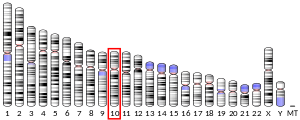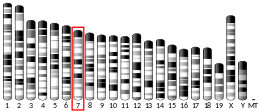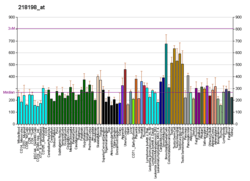DHX32
Putative pre-mRNA-splicing factor ATP-dependent RNA helicase DHX32 is an enzyme that in humans is encoded by the DHX32 gene.[5]
| DHX32 | |||||||||||||||||||||||||
|---|---|---|---|---|---|---|---|---|---|---|---|---|---|---|---|---|---|---|---|---|---|---|---|---|---|
| Identifiers | |||||||||||||||||||||||||
| Aliases | DHX32, DDX32, DHLP1, DEAH-box helicase 32 (putative) | ||||||||||||||||||||||||
| External IDs | OMIM: 607960 MGI: 2141813 HomoloGene: 56798 GeneCards: DHX32 | ||||||||||||||||||||||||
| |||||||||||||||||||||||||
| |||||||||||||||||||||||||
| |||||||||||||||||||||||||
| |||||||||||||||||||||||||
| Orthologs | |||||||||||||||||||||||||
| Species | Human | Mouse | |||||||||||||||||||||||
| Entrez | |||||||||||||||||||||||||
| Ensembl | |||||||||||||||||||||||||
| UniProt | |||||||||||||||||||||||||
| RefSeq (mRNA) | |||||||||||||||||||||||||
| RefSeq (protein) | |||||||||||||||||||||||||
| Location (UCSC) | Chr 10: 125.84 – 125.9 Mb | Chr 7: 133.72 – 133.78 Mb | |||||||||||||||||||||||
| PubMed search | [3] | [4] | |||||||||||||||||||||||
| Wikidata | |||||||||||||||||||||||||
| |||||||||||||||||||||||||
DEAD box proteins, characterized by the conserved motif Asp-Glu-Ala-Asp (DEAD), are putative RNA helicases. They are implicated in a number of cellular processes involving alteration of RNA secondary structure such as translation initiation, nuclear and mitochondrial splicing, and ribosome and spliceosome assembly. Based on their distribution patterns, some members of this DEAD box protein family are believed to be involved in embryogenesis, spermatogenesis, and cellular growth and division. This gene encodes a member of this family. The function of this member has not been determined. Alternative splicing of this gene generates two transcript variants, but the full length nature of one of the variants has not been defined.[5]
References
- GRCh38: Ensembl release 89: ENSG00000089876 - Ensembl, May 2017
- GRCm38: Ensembl release 89: ENSMUSG00000030986 - Ensembl, May 2017
- "Human PubMed Reference:". National Center for Biotechnology Information, U.S. National Library of Medicine.
- "Mouse PubMed Reference:". National Center for Biotechnology Information, U.S. National Library of Medicine.
- "Entrez Gene: DHX32 DEAH (Asp-Glu-Ala-His) box polypeptide 32".
Further reading
- Alli Z, Chen Y, Abdul Wajid S, et al. (2007). "A role for DHX32 in regulating T-cell apoptosis". Anticancer Res. 27 (1A): 373–7. PMID 17352256.
- Chen Y, Alli Z, Ackerley C, et al. (2007). "Altered distribution of heat shock protein 60 (Hsp60) with dysregulated expression of DHX32". Exp. Mol. Pathol. 82 (3): 256–61. doi:10.1016/j.yexmp.2006.11.002. PMID 17174952.
- Alli Z, Ackerley C, Chen Y, et al. (2007). "Nuclear and mitochondrial localization of the putative RNA helicase DHX32". Exp. Mol. Pathol. 81 (3): 245–8. doi:10.1016/j.yexmp.2006.07.005. PMID 16959245.
- Alli Z, Nam EH, Beimnet K, Abdelhaleem M (2006). "The activation-induced expression of DHX32 in Jurkat T cells is specific and involves calcium and nuclear factor of activated T cells". Cell. Immunol. 237 (2): 141–6. doi:10.1016/j.cellimm.2005.12.003. PMID 16414036.
- Ota T, Suzuki Y, Nishikawa T, et al. (2004). "Complete sequencing and characterization of 21,243 full-length human cDNAs". Nat. Genet. 36 (1): 40–5. doi:10.1038/ng1285. PMID 14702039.
- Strausberg RL, Feingold EA, Grouse LH, et al. (2003). "Generation and initial analysis of more than 15,000 full-length human and mouse cDNA sequences". Proc. Natl. Acad. Sci. U.S.A. 99 (26): 16899–903. doi:10.1073/pnas.242603899. PMC 139241. PMID 12477932.
- Abdelhaleem M (2002). "The novel helicase homologue DDX32 is down-regulated in acute lymphoblastic leukemia". Leuk. Res. 26 (10): 945–54. doi:10.1016/S0145-2126(02)00040-1. PMID 12163057.
- Liu J, Yuan Y, Huan J, Shen Z (2001). "Inhibition of breast and brain cancer cell growth by BCCIPalpha, an evolutionarily conserved nuclear protein that interacts with BRCA2". Oncogene. 20 (3): 336–45. doi:10.1038/sj.onc.1204098. PMID 11313963.




